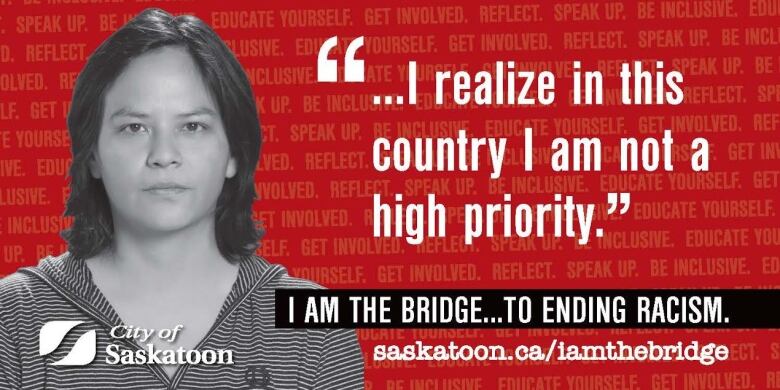'I chose my words very carefully': Face of anti-racism billboard responds to backlash
Jim Williams stands by comment about acknowledging his privilege, racist attitudes

The man whose face appears on an anti-racism billboard that has stirred controversy in Saskatoon has defended his words, saying it was not his intent to suggest other people are racist.
Jim Williams appears on one of four billboards as part of the City of Saskatoon's I Am The Bridge campaign against racism.
"I have to acknowledge my own privilege and racist attitudes," reads the quote on the sign, next to an image of Williams. He is also depicted in a campaign video.
Although there are four signs, the one depicting Williams appears to have sparked the biggest reaction from residents who feel the sign wrongly implies other Saskatoon residents are racist.
'I can only speak for myself'
Williams said he stands by his comment from the billboard.
"I understand that there's been some feeling that by putting my picture and my photo on the billboard that the City of Saskatoon is suggesting that other people are racist," said Williams.
"I can only speak for myself and that was not my intent.
"My intent was to show that whether I'm a white male or a black lesbian in a wheelchair or anything else ... I feel that it is a good thing to examine my own stuff."
Williams said he chose his words "very carefully."

City of Saskatoon response
City of Saskatoon director of community development Lynne Lacroix defended the billboards on Monday.
"It's real people who live in Saskatoon. It's not staged actors, nor did the city make up those quotes," she said.
"These billboards were not intended to suggest that all people have to do the same thing or that all people are racist."
The city spent a total $14,000 on its anti-racism campaign in 2017, up from $2,260 in 2015 and $5,521 in 2016.
This year's campaign includes advertisements in eight transit shelters as well as bars and restaurants across the city.
During the launch, Mayor Charlie Clark said the campaign was about "building relationships and a shared understanding."
With files from CBC's Victoria Dinh and Charles Hamilton